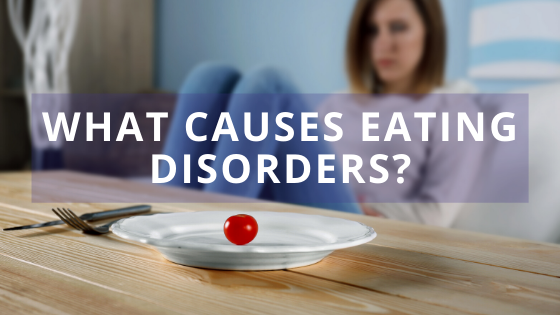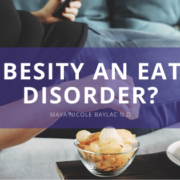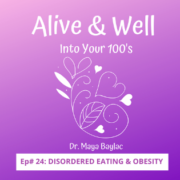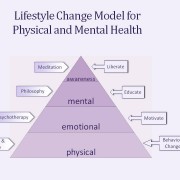What Causes Eating Disorders?
Eating disorders like bulimia, binge-eating disorder, anorexia and other disordered eating behaviors are very complex disorders that involve an intersection of cultural, psychological, interpersonal, family and physical factors.
In the last two decades there’s been a sharp increase in the prevalence of eating disorders as well as a demographic shift to include more of the adult population. This shift can mostly be contributed to cultural and technological influences as well as the impact of food corporations and Big Pharma.
The challenge is that eating disorders are not well researched. Only 93 cents is spent for each individual with an eating disorder by the National Institute of Health (NIH) research grants compared to $88.23 for each person who has Alzheimer’s or $44.44 for each person that has autism.
In this article we take a look at what causes eating disorders as we understand this intricate web of influences on our relationship with food today.
Causes of Eating Disorders
Family Dysfunction and Impact of the Home Environment
One of the root causes of eating disorders is growing up in a family that’s characterized by enmeshment, over protectiveness, rigidity, and lack of conflict resolution. The home environment is often chaotic and the family dysfunctional. When you grow up in a dysfunctional family, you experience trauma and pain through your parents’ actions, words, and attitudes.
Enmeshment describes families where personal boundaries are not defined and boundaries may by spread wide to include other members in the family, and over-concern for others leads to a loss of autonomous development.
Often a child becomes enmeshed in parental needs and become trapped in a role of meeting a parent’s emotional needs to the point where you are deprived of part of your childhood and lose the capacity for self-direction. If this family dynamic is not resolved, you may end up becoming the family scapegoat. The scapegoat unconsciously is selected by the family to act out the family’s inner conflicts as a diversion from the family’s real problems.
When a parent turns to a child with their problems instead of meeting their emotional needs through a relationship with another adult, the child’s boundaries are violated, and a heavy burden is laid upon the child’s shoulders. This phenomena is knows as covert incest (also known as emotional or psychic incest).
Emotional incest is more common in households where members of the family have substance abuse issues, mental illness or domestic violence occurs.
When a parent has some type of disordered eating pattern it will impact the child’s relationship with food as well. The development of an eating disorder can be seen as an attempt to gain control and autonomy. Children are innocent, their lives can be changed dramatically by forces in the family that they have no control over.
Personality Traits and Eating Disorders
PERFECTIONISM
Perfectionism is a personality trait that’s often present in the development of eating disorders. With perfectionism you believe your worth is dependent on being perfect and you may become obsessed with obtaining perfection.
Perfectionistic aims may be a way to fight strong emotions like not feeling good enough, underlying anxiety and depression or protecting deep wounds from past emotional trauma.
Perfectionism can go beyond the personal and physical self. It isn’t always just that you have to be and look perfect, it’s that everything in your world has to be, look and feel perfect.
Research has identified that when you come from a place where there’s been extreme emotional trauma that you had no control over, you compensate for that by having control in other areas of your life, or even every single area of your life that you can control. This control makes you feel safe, it makes you feel OK and that everything around you is OK. On the other hand, when things are not perfect, then things feel out of control and this can be experienced as a very scary place.
IMPULSIVITY
The tendency to act on a whim without forethought, reflection, or consideration of the consequences is highly associated with binge eating. Individuals with bulimia show higher levels of recklessness. When you have problems inhibiting your responses, it’s harder to hold back the automatic response to binging.
OBSESSIONAL
Obsessional personality traits seem to be a risk factor that contributes to compulsive preoccupation with food, diet, exercise, body shape and control.
Psychological Factors in Eating Disorders
LOW SELF-ESTEEM
Research supports the strong relationship between low self-esteem and eating disorders. You may have a negative self-image and body image, have feelings of inadequacy and be excessively concerned over how others evaluate your appearance. You may try to ‘shame’ yourself by thinking or believing that you have no willpower or self-discipline in the hope that it will encourage normal behavior, but it doesn’t.
DIFFICULTY EXPRESSING EMOTIONS
People with eating disorders often have unexpressed emotions. You may have difficulty with determining what you feel and how to express what you feel. You may have to learn how to process your emotions and how to express them.
Lack of emotional regulation can be due to childhood trauma and neglect. Some people will “eat their emotions” rather than express them. You may need to be given permission to express your emotions and be provided with a safe environment to release pent up emotions.
We may think that we can shut down certain emotions and not feel them, but studies show that we cannot selectively shut down an emotion. The suppression eventually leads to health problems and psychological problems.
FEELINGS OF HELPLESSNESS
When negative events in life occur, you may feel that there’s nothing you can do to improve the situation. You experience a loss of power in your life and may feel backed into a corner. You may not possess adequate coping mechanisms and resort to food or food restriction for comfort – at least that’s something you can control.
TRAUMA
Traumatic events like domestic violence, child abuse and sexual abuse can initiate eating disorders. Research shows that girls with post-traumatic stress disorder (PTSD) related to sexual abuse have a higher incidence of eating disorders. Eating disorders can develop as a way to gain control over traumatic events.
Socio-Cultural Influences on Eating Disorders
SOCIETAL VALUES & CULTURAL VIEWS ABOUT THE BODY
In westernized societies today, a significant cultural value is placed on thinness. The message is basically thin = good. The problem is that this idealized thin body stereotype isn’t usually attainable.
Statistics show that people of higher socio-economic status have higher incidence of eating disorders. This may indicate that the pressure to be thin is more intense amongst the wealthy. There is also a correlation with higher levels of eating disorders for men in the LGBTQ community.
MEDIA
The media bombards us with a constant influx of images and visual communications that represent very narrow definitions of beauty. This beauty is manufactured with the use of software like Adobe’s Photoshop rather than a true representation of natural beauty.
Striving to attain these standards of impossible thinness and air brushed beauty can set us up for disordered eating that quickly spirals out of control.
PHOTOSHOP
With computer graphic tools like Photoshop, it’s easy for advertisers to manipulate photos and therefore produce and distribute images of perfection. In the United States, for example, standards for honesty in advertising are lower than other countries like the UK who’ll often reject ads that’s been heavily photoshopped to create unrealistic, fantasy images.
PRO-ANA CULTURE
This is a subculture that focuses on how to be anorexic. “Pro-Ana” stands for pro-anorexia. There are websites and other information that promotes anorexia and its members encourage and support each other in the quest for thinness. These websites often have manifestos, affirmations and rules that pro-anas live by. They also post “Thinspiration” pictures of gaunt individuals with bones showing to inspire their commitment to their anorexia.
Biological Factors that Causes Eating Disorders
There are a variety of biological factors that can contribute to the development of eating disorders.
GENETIC PREDISPOSITION
Family, twin, and adoption research studies provide compelling evidence that genetic factors play a role in the development of eating disorders. Individuals born with certain genotypes are more likely to develop an eating disorder. Risk of eating disorders increases 7-12 times when you have a direct family member who’ve had an eating disorder.
EPIGENETIC INFLUENCES
Epigenetics look at how gene expression gets modified – turned on and off – by environment, lifestyle, illness, thoughts and emotions. These regular and natural occurrences of epigenetic changes do not alter the underlying DNA sequence as in genetic mutation. Research suggests that gene expression modifications do play a role in what causes eating disorders, however this research so far is minimal and further data is required to draw conclusions.
BIOCHEMICAL IMBALANCES
In some individuals with eating disorders, certain chemicals in the brain that control hunger, appetite and digestion have been found to be unbalanced. This research is still inconclusive and more evidence is needed to determine the exact biochemical causes of eating disorders.
HORMONE IMBALANCES
When hormones are out of balance the body can get its signals mixed up and can cause strong food cravings. Hormonal imbalance can lead to low serotonin (a “feel-good” brain neurotransmitter) levels which can cause the body to want a pick-me up – usually a craving for sugar or carbohydrates.
Hormone imbalances can also lead to mood swings which can cause you to turn to food to alter the mood you’re in. When these behaviors turn into a regular coping behavior it can lead to an eating disorder.
AUTOIMMUNE DISEASES
A Finish study published by the Department of Public Health at the University of Helsinki, Finland, found that the immune system seems to play a significant role in the onset and longevity of eating disorders.
Other biological factors are brain tumors, calcifications and lesions as well as complications related to childbirth.
Body Changes
PUBERTY
During puberty we go through many body and hormonal changes which often can lead to weight gain, difficult emotions and mood swings. Without proper guidance and understanding of what’s occurring and tools on how to cope, eating disorders can start to take root in these adolescent years.
LIFE TRANSITIONS AND EVENTS
Some women find the impact of pregnancy and giving birth on their bodies along with the hormonal changes to be unbearable. They may develop an eating disorder to gain control over their shape or due to lingering hormonal imbalances.
As we age our metabolism slows down and further hormonal shifts can make it more difficult to stay at our normal weight. Individuals that are unwilling to accept these body changes may develop disordered eating patterns in later years to maintain their previous youthful figure.
Coexisting Mental Health Issues and Eating Disorders
DEPRESSION
Half of all individuals with binge eating disorder have a history of depression. When we are depressed or sad we tend to eat more than usual or lose our appetite altogether. Eating helps to numb the pain when we’re depressed. Eating more than usual is one of the symptoms of depression. Depression can be a cause or effect of eating disorders.
ANXIETY
It is common to have a diagnosis of anxiety prior to the development of an eating disorder. Of those seeking treatment for eating disorders 69% reported that anxiety preceded their eating disorder. Eating disorders can become a way of coping with and managing anxiety. There is also the building up of anxiety that occurs before disordered eating episodes like binging. Statistics show that 13.5% of those getting treatment for anxiety have an eating disorder as well.
BIPOLAR DISORDER
Twenty four percent of people with bipolar disorder also have symptoms of eating disorders, while 44% of people with bipolar disorder have difficulty controlling eating.
ADHD
Research has shown that girls with Attention Deficit Hyperactivity Disorder (ADHD) have higher incidence of eating disorders.
SUBSTANCE ABUSE
Alcohol and drug abuse are four times more likely in those with eating disorders. Like alcohol and drugs, food is another substance to numb ourselves with.
Big Business
Some argue that large food corporations and big pharma contribute to the development of eating disorders as well. Marketing messages are crafted to build dissatisfaction with who we are and how we look and paint the picture of finding a miracle solution in some diet or even pharmaceutical product.
Food manufacturers influence eating and weight by the kind of food they bring to the stores. Over the last sixty years food has become less natural and more processed. Corn, sugar, soy, and wheat are present in everything we eat while growth hormones in meat and milk, and antibiotics in meat, diary, and fish wreak havoc on our hormones and microbiome. The latter being two of the most important factors that determine body shape. Since our food supply is designed to make it harder and harder to stay in shape, more people are taking drastic measures or turn to emotional eating.
Clearly what causes eating disorders is seldom one root cause, instead it’s mostly a complex interaction of various causes that gets woven together over time and manifests as an eating disorder. Addressing the underlying causes and beliefs is the key to recovery.
At Hawaii Naturopathic Retreat’s residential eating disorder treatment center in Hawaii our holistic, integrated and customized program takes a non-disciplinary approach that resolves the root causes of eating disorders in a safe, supportive environment.
Eating Disorder Resources:
- Eating Disorder Hope – a fantastic resource for all things regarding eating disorders.
- Eating Disorders Screening Tool – from the National Eating Disorders Association (NEDA).
- The Illusionists – A powerful documentary film to create awareness around the media’s influence on body image.







